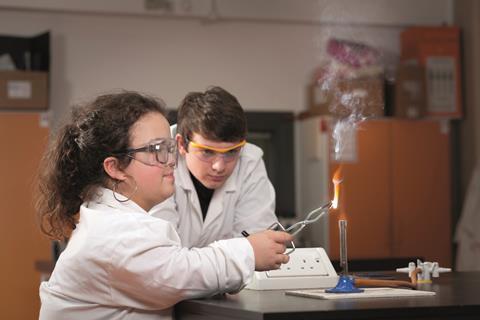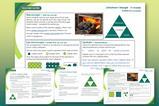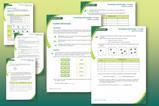Dissolving doesn’t mean disappearing – don’t let students fall into the trap of applying everyday meanings to chemistry terms
Explanation is at the heart of teaching chemistry. Much of the language used is subject-specific. Without a confident understanding of this vocabulary students struggle to understand the chemistry concepts being explained.
Some keywords in chemistry are also used in everyday language, either with less precision (eg melting and dissolving) or with an entirely different meaning (concentration). This adds to the challenge for students.
In some cases, these differing everyday meanings can reinforce or even introduce misconceptions about chemical concepts. Research has found that, even after teaching, some students display a preference for the use of everyday language meanings over the scientific.

It is important for teachers to be aware of these linguistic pitfalls so they can support students to develop a clear understanding of the difference in meaning between the everyday and scientific uses.
Some key examples of ambiguity in meaning occur with words frequently used as part of chemistry topics taught to younger students (11–14). Addressing misunderstandings at the outset should help improve understanding of the more advanced topics studied at age 14–16 and beyond.
It is also important that students recall and understand the scientific definitions of keywords. However, these too can lead to misconceptions. Writing simple, yet chemically accurate definitions is a challenge. I’ll explore the potential pitfalls in another article.
Dissolve
When salt dissolves, it looks as if it has disappeared. This can lead students to hold the misconception that after dissolving, the salt is no longer there.
Unfortunately, in the non-scientific world, the word dissolve is sometimes synonymous with the word ‘disappear’. Phrases such as ‘dissolves away’ or ‘dissolves into thin air’ illustrate this. Rather than challenge the misconception, this everyday language reinforces it.
The erroneous link between dissolving and disappearing may give rise to an even more misleading use of language. Acid rain is known to damage limestone. Unfortunately, this chemical reaction is often described, incorrectly, by sentences such as ‘acid rain dissolves away the limestone’.
It is unsurprising that, having observed the reaction of a marble chip in acid, a student may describe what has happened as the marble chip ‘dissolving’ in the acid. Of course, what has actually dissolved is a product of the chemical reaction between the marble chip and the acid.
Johnstone’s triangle can help here. It suggests an expert chemist switches rapidly between three levels of thought: the macroscopic, sub-microscopic and the symbolic. Use the triangle to encourage students to think not only about what they’ve seen, the macroscopic, but also the particles involved, the sub-microscopic. At the particle level, the dissolving process is clearly different to the rearrangement of atoms in a chemical reaction.
Reaction

Teachers often introduce students to a range of exciting and spectacular chemical reactions. This may result in some students focusing on the most noticeable feature of the reaction (for example, the flame). Students may mistakenly regard a chemical reaction as an ‘event’, rather than thinking about the formation of a new substance or substances.
When you introduce the concept of chemical change, choose a less spectacular reaction (for example, a solid-solid reaction with a colour change). Emphasise the formation of a new substance with different properties (the colour change). With a more dramatic reaction, such as burning magnesium, ensure students look for evidence that a new substance has been formed after the reaction has finished (eg the white magnesium oxide). For a suitable solid-solid reaction, BEST’s Big idea topic 1: Chemical change is useful, particularly the diagnostic question ‘colour change’.
When you introduce the concept of chemical change, choose a less spectacular reaction (for example, a solid-solid reaction with a colour change). Emphasise the formation of a new substance with different properties (the colour change). With a more dramatic reaction, such as burning magnesium, ensure students look for evidence that a new substance has been formed after the reaction has finished (eg the white magnesium oxide). For a suitable solid-solid reaction, BEST’s Big idea topic 1: Chemical change (bit.ly/2ZhMueg) is useful, particularly the diagnostic question ‘colour change’.
Indicator
Many students think that all chemical indicators show whether a solution is an acid or an alkali. At home students may have met the word indicator in relation to their car, for signalling the intention to move left or right. This reinforces the misunderstanding.
At 11–14 this may not seem to be a problem. However it can lead to confusion later when other indicators are used in titrations. Methyl orange and phenolphthalein do not change colour at pH 7.
You can challenge this misunderstanding by introducing students to a range of indicators at an earlier age. The Making a universal indicator microscale experiment from CLEAPSS shows easily and clearly that colour change doesn’t always occur at pH 7.
You can challenge this misunderstanding by introducing students to a range of indicators at an earlier age. The Making a universal indicator microscale experiment from CLEAPSS (bit.ly/2WzfL75) shows easily and clearly that colour change doesn’t always occur at pH 7.

Topics
Avoid the pitfalls of language

Help students learn the difference between everyday and chemistry vocabulary
 Currently
reading
Currently
reading
How to avoid the pitfalls of language
- 2
















No comments yet